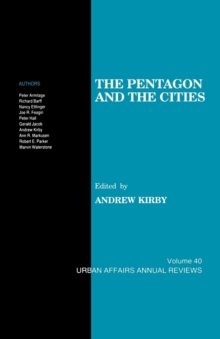The U.S. military employs large numbers of people, consumes vast amounts of material, and is continually upgrading and changing to meet new strategic circumstances.
This has a direct effect on those cities in which military bases and/or contractors are located. Andrew Kirby and the contributors to this provocative volume explore the significant role of federal defense spending--the military-industrial complex--in both regional and urban development.
A controversial issue, especially during the military buildup of the Reagan administration, military spending has often been examined in the literature at a macroeconomic level, but seldom from the important perspective presented here of the relationship between the Pentagon and the residents and corporations of local economies. Well-written and expertly edited, The Pentagon and the Cities lays out basic perspectives on the influence of military activity on local economies, the ways in which urban elites have linked development to defense spending, and the growth of political coalitions that resist such expenditures.
The contributors competently guide readers through an examination of the historic role of defense expenditure, patterns of regional change, restructuring the military-industrial complex, and the impact and transformation of regional economies.
Particular empirical examples highlighted include the cycles of growth and decline of New England's local economies, as well as the free enterprise cities of Houston and Las Vegas. This highly enlightening and stimulating volume is fascinating reading for advanced students and scholars in the areas of urban studies, policy studies, political science, and geography. "The principal purpose of this interesting book is to relate cities to defense and to explain the spatial development of the defense industry.
It largely succeeds in both. . . . The book reinforces the perception that the military industry is enormously complex, and whether we build it up or tear it down, it will require a willingness to forgo simple solutions to what is obviously a very complex problem. . . . The book makes an important contribution to the study of the military and cities.
It certainly explains much of the geography of defense spending, and it insists upon a connection between cities and defense." --Roger W.
Lotchin, University of North Carolina, Chapel Hill "The strength of The Pentagon and the Cities, particularly in the last two chapters, is the ability to create linkages between economic, political, and ideological issues.
If the democratic process is to be effective in the conversion to a non-militaristic economy, these issues will have to be confronted on an individual and local level." --disClosure: A Journal of Social Theory "The principal purposes of this interesting book are to relate cities to defense and to explain the spatial development of the defense industry.
It largely succeeds in both. . . . The book makes an important contribution to the study of the military and cities.
It certainly explains much of the geography of defense spending, and it insists upon a connection between cities and defense. . . . this volume is a good place to begin learning about cities and defense spending." --Urban Geography "This volume serves nicely as an introduction to a claim that recently has come to the forefront of the economic development debate in the United States: that defense spending was the implicit national economic development policy in the postwar era. . . . The volume also passes the acid test of utility. I have found numerous occasions to cite it as a reference in both casual and intellectual conversation in recent weeks. . . .The Pentagon and the Cities is quite successful as an overview of the defense expenditure as economic development policy contention. . . . Kirby and his supporting authors have produced a quality, highly readable volume on the implications of defense expenditure for regional economic growth.
This book should find a willing market among scholars and practitioners in the field of regional economic development." --Economic Geography "The Pentagon and the Cities is the latest in the series of Urban Affairs Annual Reviews that deal with a timely research question. . . . The papers in this collection lay important groundwork for promising future research in political sociology, work and occupations, and social stratification.
The book is at its best when discussing the effects of military spending and its decline on specific communities. . . . The editor and writers are to be commended. . . . The accumulation and description of data on the effects of military spending on local communities present a convincing picture that no sociologist studying local labor markets and political organization can ignore." --Contemporary Sociology

